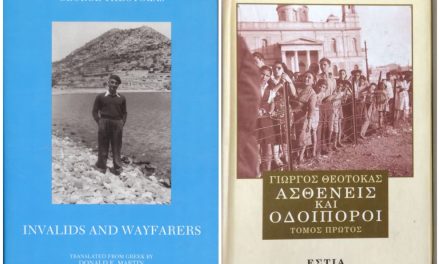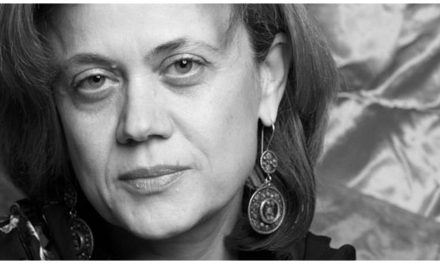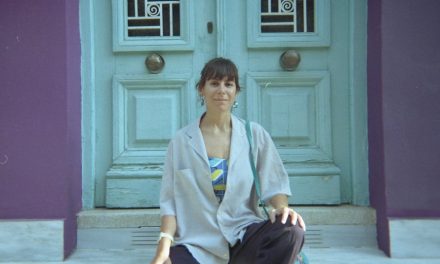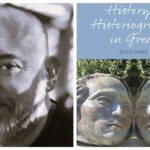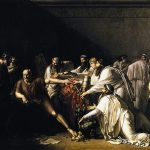Maria Voulgari is a singer/songwriter, performer and poet. She has been singled out for the particular timbre of her voice, the performance of her songs and the specificity of her writing. She has published the poetry collections G sharp minor (2019), Ginger Scent (2023), 225 (2025). Her poems have been translated into English and Portuguese. She already counts five personal albums and four independent productions. Her songs and poems have won first prizes in international competitions.
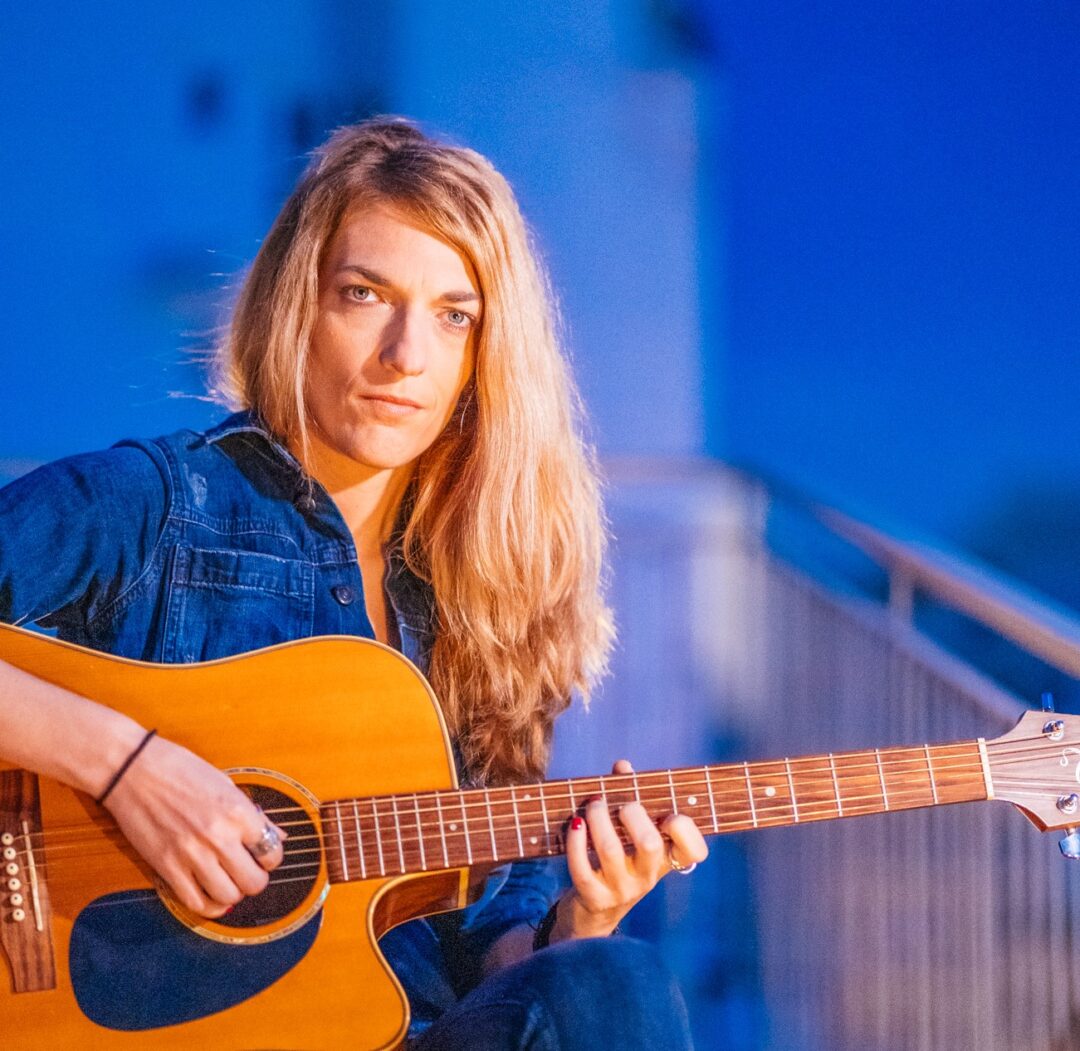
You have published three poetry collections, G sharp minor (Issuu, 2019), Ginger Scent (Anemos Ekdotiki, 2023), 225 (Apopeira Editions, 2025.) Which are the main themes your poetry touches upon? Are there recurrent points of reference in your writings?
Recurrent themes in all three of my poetry collections are love, separation, loss, absence, silence, memory, reminiscence, nostalgia, self-love and self-worth expressed through personal experiences and feelings.
Love is the starting point. It is the driving force. It is a celebration but also a crack. It is desire, absence and redemption. Love potentially acts as a mirror of the soul, revealing aspects of the self that would otherwise remain hidden. It is mentioned both as a force of creation and inspiration – as a flame that pushes and gives meaning – and as a source of vulnerability and sometimes melancholy or disappointment for those things that didn’t happen or that I wish had turned out differently.
Separation, the emotional transitions of the heart, nostalgia not as a regression but as a ritual of reconstructing the self and a bittersweet reminiscence of what has been lost or changed, often return in my writings. At the same time, a writing challenge for me is the power that is born when you dare to stand before the light and stare it in the face. The power of loving yourself through the cracks, because it is through them that light enters. That is where a new self and the essence of poetry are born.
My motto is:
Where you dare not go,
there is all the light you are afraid to give birth to.
From my second poetry collection Ginger Scent and third poetry collection 225
You are also a well-known singer/songwriter with five personal albums, four independent productions, live performances and awards both in Greece and abroad. How did it all begin?
It all started from my love for music, which was in me from an early age. I remember myself writing lyrics, melodies, singing, playing the guitar and trying to capture it all on paper.
At the age of nine I started classical guitar lessons. It was my father who motivated me to take up this art. He was a teacher of Byzantine music. Although I never turned to Byzantine music, he nevertheless gave me the right tools and stimuli to love music and singing very much. At the age of 14 I wrote my first song. It was then that I felt that something was there and that was the trigger for what came next. The guitar became an extension of myself, a means of expressing my emotions and my soul.
The first appearances in small music scenes were important. It was the moment when I realized that my voice and the way I performed the songs touched people. I started with independent productions on some of my songs. One of them was “Thelo apopse/Esta noite”, one of my first Greek-Portuguese songs which was heard a lot on the radio and was later featured in a documentary on ERT- Greek state television. I even remember when I sang it in a music scene in Lisbon; the Portuguese thought I was Portuguese. They couldn’t believe that a Greek woman could speak Portuguese, write Portuguese lyrics, music, and perform in their language. They found it very strange but at the same time impressive and attractive, from what they told me.
I officially entered the record industry in 2018 with Anagennisi. A song I wrote the same year on the occasion of the fires in Mati, Attica. It was a poem written by Vassilis Samoilis which deeply moved me and I set it to music in ten minutes. From my first steps in music to the release of the albums and the scenes that hosted me, there was always a pulse, that of inner listening, a kind of mental and emotional expression and uplifting.
On stage, in live performances, that’s where I feel a direct connection with the audience. Every live performance is a new experience, a chance to share my songs and connect on a deeper level with people. For me, the most important thing is indeed communication with the audience, the moment when a song touches their heart. And I believe this is the greatest reward for an artist, that their work can touch more souls.
The awards came later. I would say it was a kind of recognition of my work, both in Greece and abroad. It is certainly an honor and a reward, but above all, it is a vindication that beyond talent, love, perseverance, passion, study, patience and dedication to art can lead to beautiful achievements.
I measure my journey in music and art in general not only by productions or accolades, but by everything in between. In the silences, in the pauses between notes and in life itself, where the truest moments are born. It is in these moments that everything begins, and it is in them that I lean and continue forward. And this is how I evolve as a creator, but also as a human being.
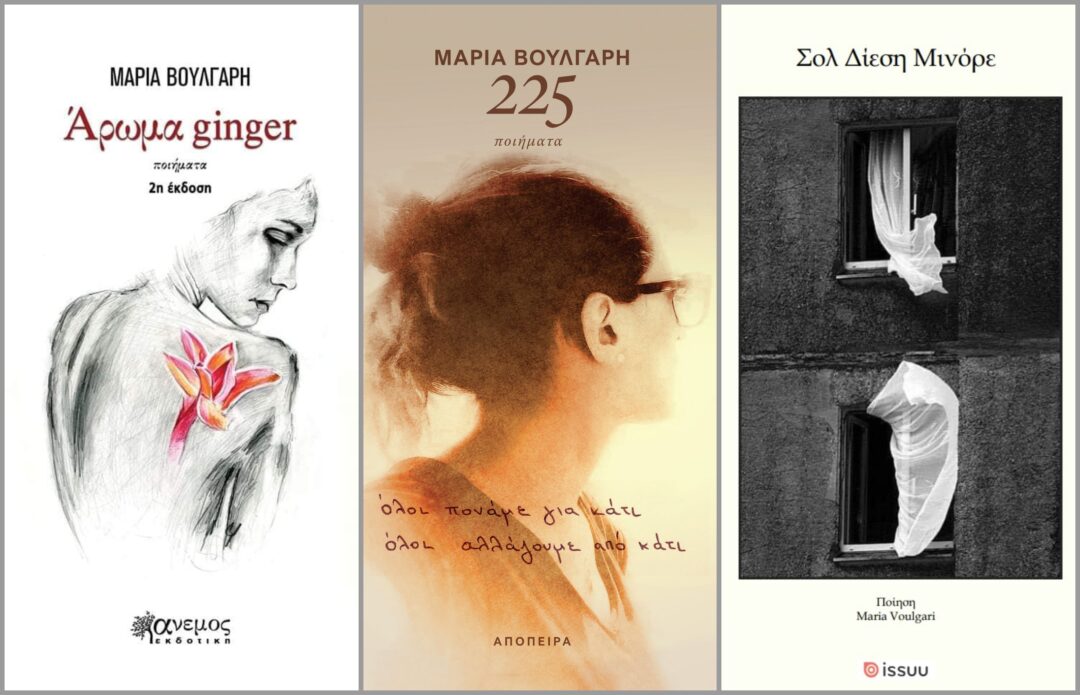
Would you say that music and poetry constitute communicating vessels? What is that binds them together?
Music and poetry are undeniably communicating vessels. “Music gives soul to hearts and wings to thought”, in the words of Plato. As Giorgos Sarantaris eloquently put it, “poetry is that self of ours that never sleeps”. They constitute the two sides of the same human need to create, express and communicate, at times, the existent, at others, the inexplicable.
Music gives wings to the words of poetry and becomes a journey, while poetry gives body and concrete meaning to the abstract vibrations of music. Music is melody and rhythm that “makes” words and images because that is where emotions lie. Ιn turn, poetry has an internal rhythm, a musicality that comes from the choice of words, syllables, vibrations and pauses.
Personally, I reckon that both arts are powerful means of expressing emotions. Poetry creates vivid images and narratives through words. A poem can convey joy, sadness, tension, passion, melancholy, love, while music achieves the same through sounds and rhythm. Often, music enhances poetic expression and vice versa, reaching the feelings, the heart and soul of the recipient.
Music, even without lyrics, can create mental images, tell a story or mobilise a mood. Orchestral pieces are a prime example of this narrative power of music. For me, music and poetry are intertwined. I cannot separate them. It’s like having two children and having to choose to love one of them more. I can’t do that.
You recently sang fado, the traditional Portuguese musical genre, in a creative co-existence with Afentoula Razeli singing rebetika. Tell us a few things about this seemingly odd mix.
The words of Amalia Rodigues, “I don’t sing fado, fado sing in me”, is something I identify with. I love fado, Portugal, the Portuguese language and culture. I lived in Lisbon, learned the language and loved the sounds of this country. I started singing fado when I returned to Greece. I remember my first live performance dedicated to Portuguese music and fado in 2015, at a historic bookstore in Corfu. It was there that I felt that something new was born because the response of the people was very warm. Since then I have incorporated fado into my repertoire.
Coming to the present day, the meeting with Afendoula Razeli in August 2024 was decisive. Her great love for rebetika and my great love for fado were perfectly combined into a common performance. It is worth noting that both musical genres are classified as intangible cultural heritage by UNESCO.
The event titled “When rebetika met fado”, which took place last March at the Major Seven music scene, aimed to highlight the influence of the rebetiko music traditions and their affinity with Portuguese fado. Both genres express deep emotions such as pain, loss, love, social injustice and loneliness. There is a strong element of destiny, the word “fado” meaning fate in Portuguese, as well as complaint or fatalism in rebetiko. They are linked to the margins, the daily struggle and the pain of everyday people.
Through this event, we wanted to highlight the cultural connection and the common emotional forms that characterize both the rebetiko and Portuguese musical traditions, while honoring the memory and the work of the great creators of rebetiko song. This event will be hosted and repeated at the Rematia Festival on 2 August 2025.
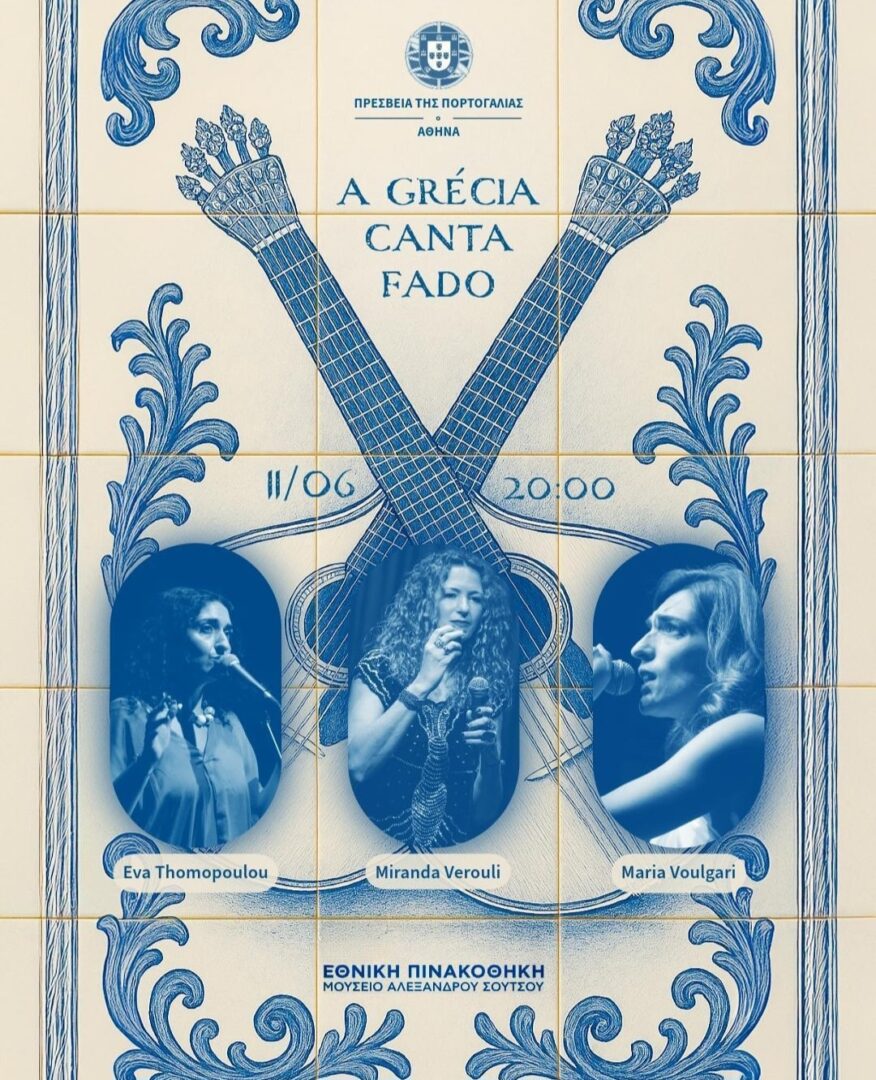
Quite recently you took part in the concert “Greece Sings Fado”, as part of the celebration of the National Day of Portugal. Tell us a few things about the experience.
Οn 11 June I was honoured to take part in the concert “Greece Sings Fado” as part of the celebrations for the National Day of Portugal, of poet Camões and of the Portuguese Communities all over the world, an evening dedicated to the Portuguese fado – the most emblematic Portuguese musical expression, classified as Intangible Cultural Heritage by UNESCO.
The concert took place at the National Gallery – Alexandros Soutsos Museum, a space of great cultural and artistic relevance in the Greek capital, reinforcing the ties of friendship and exchange between Portugal and Greece. This initiative by the Embassy of Portugal was supported by Camões, I.P. and aimed to promote dialogue through music, building bridges between two cultures with strong Mediterranean traditions.
I had the pleasure to share the stage with Eva Thomopoulou and Miranda Verouli together with talented musicians by singing songs of the Portuguese repertoire, paying tribute to composer Carlos Paredes in the context of the celebrations of the centenary of his birth and demonstrating the universality and timelessness of Portuguese culture. This event at the National Gallery under the aegis of the Embassy of Portugal in Athens is for me one of the most important moments in my musical career so far.
How do contemporary Greek artists and writers relate to global artistic and literary trends? Where does the local/ national meet the global and the universal?
In today’s globalized world, Greek creators in the field of literature and music do not operate in isolation, but are in constant contact with global artistic and literary trends. I would say that this enables a creative and dynamic interaction. The new generation of Greek writers is often cosmopolitan, with studies and experiences abroad. This allows them to see Greek reality from a broader perspective, to incorporate different cultural references and to create works that are profoundly Greek and at the same time address a global audience.
In addition, an increasing number of works by Greek authors are being translated into other languages. This allows the extroversion of Greek literature, its presence at international book fairs and literary festivals. The awarding of literary prizes to Greek writers (e.g. Nobel laureates George Seferis and Odysseas Elytis in the past) and their inclusion in international anthologies enhances their visibility and recognition in the international intellectual exchange.
In music as well, there is also the mixing of the old with the new or the sounds, rhythms and melodies of one country with another. As a personal example I would like to mention the following: In December 2024, one of my Greek-Portuguese songs titled “An borousa/Se eu pudesse” was released as a single album by Mirror Music. It’s a duet I wrote (music and lyrics) which we perform together with the Portuguese Rita Dias. Through this song I wanted to unite two important cultures and two languages, Greek and Portuguese – which I love very much – in a common musical world.
It was my wish that this song should serve as a cultural bridge between the two countries, highlighting common values, emotional affinities and aesthetic traditions that unite the Greek and the Portuguese culture. It is my firm belief that this collaboration can contribute substantially to the promotion of cultural relations between Greece and Portugal, offering the audiences of both countries an authentic artistic creation. “An borousa/Se eu pudesse” was warmly embraced by the people, as well as by the Embassy of Portugal in Athens and the Embassy of Greece in Lisbon.
The meeting point of the local and the global lies in this dialectical relationship where the national is not lost but transformed. It becomes recognizable and communicable on a universal level.
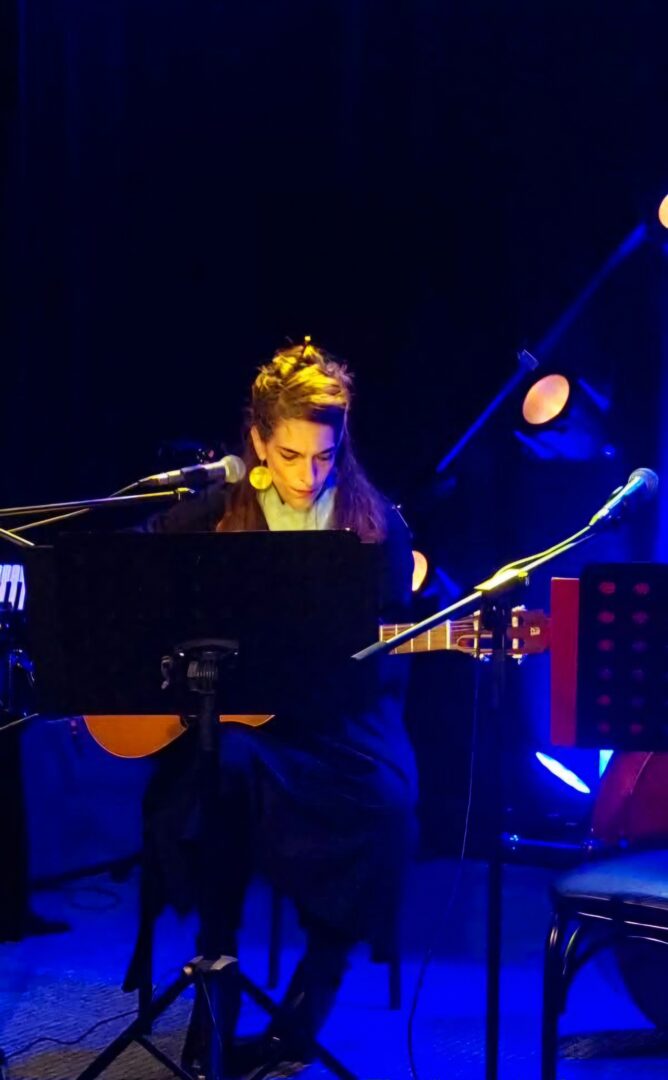
In a world divided by borders, would you say that music could act as a unifying force bridging cultural differences and fostering deeper understanding between peoples?
Undoubtedly, music acts as a powerful tool, a unifying force that builds bridges, creates channels of communication between peoples and reminds us that there are common human values, experiences and emotions that unite us across borders, national identities and cultural differences. Music has the ability to touch the human soul on a deep level. Through music, people are exposed to different cultural customs and traditions and this is very important for the development of both the individual and society as a whole.
Several songs have been written to express social, political or humanitarian messages. Music can be a means of promoting peace, justice, equality and unity, reaching a wide audience and mobilising people for common goals. Concerts and festivals, for example, bring together people from different backgrounds. Participating together in a musical event creates bonds and communities, regardless of nationality or origin. Music is a universal language, a language that does not require translation. It speaks directly to the heart.
*Interview by Athina Rossoglou
TAGS: LITERATURE & BOOKS | READING GREECE

